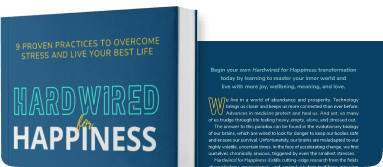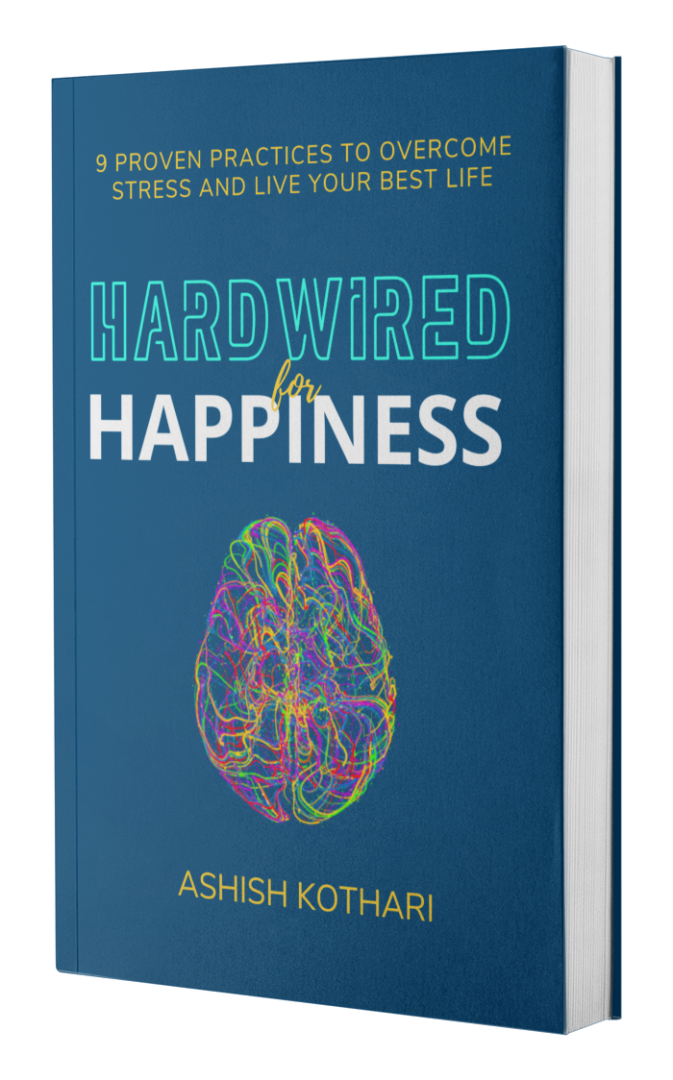Part 2: Breaking Free from Unhappiness Habits with Ashish Kothari

Did you know that some of your daily habits are hindering your happiness? Unhappiness habits are like worn-out paths: easy to follow but leading nowhere good. By clinging to these familiar yet damaging patterns, we risk missing out on life’s rich experiences and opportunities. The good news is, we can learn to break free from them.
In this article, we’ll dig into three common unhappiness habits that might be casting a shadow over your life. Read on and learn practical ways to break free from their grip and unlock a happier you.
“We’ve made unhappiness a habit, but we can break these habits and build new ones by truly making happiness our competitive edge.”
– Ashish Kothari
The habit of excessive sitting
Did you know that prolonged sitting can contribute to a host of health issues including heart disease, diabetes, and mental health decline? If we look back at history, early humans were always on the move, hunting, gathering, farming, or simply walking long distances. But now, it seems our fast-paced world has transformed us from active hunter-gatherers to sedentary desk jockeys.

Sitting is the new smoking, as the Mayo Clinic reminds us. When we remain stationary for extended periods, it disrupts our natural physiological functions. Essentially, while sitting might seem harmless, it’s a silent threat to our overall well-being. So, how can we break free from this “unhappiness habit”?
5 ways to break the unhappy habit of sitting
There are five simple things you can do to break the habit of excessive sitting:
- Implement Standing Breaks – Stand every 30 minutes to counteract the metabolic slowdown caused by prolonged sitting. Incorporate short walks, especially after meals, to improve glucose metabolism and reduce blood sugar spikes.
- Utilize Sunlight and Nature – Combine walking breaks with exposure to sunlight and nature, enhancing the physical and mental health benefits.
- Invest in a Standing Desk – Use a standing desk to alternate between sitting and standing throughout the workday, which can help reduce the negative health impacts of continuous sitting.
- Convert Meetings to Walking Meetings – Change sedentary meetings to walking meetings to boost creativity and ensure physical activity during work hours.
- Integrate Movement into Daily Commutes – Encourage small changes like parking further away, using stairs instead of elevators, or biking to work to increase daily physical activity. Organize team challenges to promote movement and make it a fun, collective goal.
Poor sleep quality and quantity
Are you treating your body like a 24-hour convenience store, open all night with no time for restocking or cleaning up? Many of us are, and the cost is more than just the price of an extra espresso to make it through the day. But what’s causing us to sleep less? It turns out, there are several factors at play:
- Busyness and Hustling: We are trying to do too much and constantly feeling not enough, hustling for worth, which affects our sleep quality.
- Disrupted Natural Rhythms: Gone are the days when we woke up to natural sunlight and maintained natural circadian rhythms. Now, we spend much time indoors in artificial light.
- Screen Time Before Bed: Many people use screens (TV, phones, computers) even 5, 10, 15 minutes before bed, leading to excessive mental activity. This prevents our brains from decompressing. The blue light from screens affects melatonin production, which is essential for sleep.
- Caffeine Consumption: Our caffeine habits, like having coffee at 4 PM, result in caffeine still running through our body at 10 PM. This interferes with melatonin attaching to neural pathways, making us feel less sleepy and delaying our sleep.
- Irregular Sleep Schedules: Irregular sleep schedules, due to global work schedules and constant calls, disrupt our sleep rhythms. Traveling across different time zones further interrupts our natural circadian rhythms.
- Travel and Time Zones: Frequent travel and crossing multiple time zones can confuse our bodies. Even if we fall asleep out of exhaustion, we don’t wake up feeling refreshed, indicating disrupted sleep quality.
- Alcohol Consumption: Using alcohol to fall asleep can lead to poor sleep quality and waking up not feeling fresh.
Not only are we not sleeping enough, but our quality of sleep is terrible. And we’re paying a high price in terms of heart disease, feeling the hard crunch of weakened immune systems, and watching our waistlines expand from too much junk food fueled by sleep-deprived cravings. And let’s not forget the mental checkout: irritability, anxiety, stress, short-temperedness, and eve brain fog.

5 ways to improve your sleep quality and quantity
While you might think you’re winning the race by staying up late, you’re actually running your system into the ground. But here are five things I recommend to improve your sleep quality and quantity.
- Maintain a consistent sleep schedule – Go to bed and wake up at the same time every day, even on weekends, to significantly improve your sleep routine.
- Reduce caffeine intake – Avoid caffeine after noon or at least by 2 p.m. Instead, engage in physical activities or try the Bhastrika breathing technique for a natural energy boost.
- Limit screen time before bed – Try to stop using screens at least one hour before bedtime and consider reading as an alternative.
- Optimize your sleep environment – Use darker curtains and maintain cooler temperatures in your sleeping area to enhance sleep quality.
- Practice a body scan relaxation technique – If you struggle to fall asleep, avoid using your phone or other devices and try a body scan from head to toe, which can help relax your body and mind, aiding in falling asleep quicker.
Disconnection from nature
When was the last time you spent time in nature and the great outdoors? Some research highlights a disturbing trend: children with less exposure to green spaces have a 55% higher risk of developing mental health issues. Adults are not immune either; our own levels of stress and anxiety correlate directly with our separation from natural environments.
The modern world has increasingly drawn us indoors, but there’s a growing body of evidence suggesting that spending more time in nature is essential for our well-being.

3 ways to re-engage and reconnect with nature
Humans are inherently connected to nature. We are products of it, dependent on it for survival, and influenced by it in countless ways. Reconnecting with nature in small, manageable steps can significantly improve our well-being. Here’s how:
- Take Small Breaks in Nature – Include small breaks in your day by stepping outside for 10 minutes to enjoy sunlight, visiting nearby parks, or bringing a small green plant to your desk or home office to benefit from having nature in sight.
- Engage in Nature-Related Activities – Invest in nature-inclusive activities with your team or family, such as gardening, weekend hikes, or simply sitting in a park disconnected from technology, and advocate for more green spaces in your community and plants in your office to foster a more natural environment.
- Spend Time in Natural Settings – Spend time at least once a quarter in natural settings like national or regional parks, using this opportunity to disconnect from devices, connect deeply with each other, and appreciate the natural energy and beauty around us.
Conclusion
We’ve been conditioned to believe that endless sitting can give us comfort, sleep deprivation means we are more productive, and indoor isolation is the new norm. But these comfortable traps are actually sabotaging our health and productivity. To truly thrive, we need to move, rest, and reconnect with nature.
Are you caught in a cycle of unhappiness? Your daily habits might be to blame. In this episode, Ashish Kothari, Founder of HAPPINESS SQUAD, exposes three common “unhappiness habits” hindering your joy. Learn how to break free from these patterns and cultivate a more fulfilling life.
Learn more about Ashish at his LinkedIn.
Listen to the podcast with Ashish below.
Access and subscribe to all of the episodes of the Flourishing Edge Podcast here.
Visit the REWIRE Program powered up by the HAPPINESS SQUAD Community and experience your shift within your 30-day risk-free trial today. Cultivate your Self-Awareness, Gratitude, Purpose, Community, and personal growth more through the 9 Hardwired for Happiness practices. Integrate simple and proven micro-practices grounded in the science of happiness and neuroscience of habit formation in 5 minutes a day.
Make Flourishing Your Competitive Edge.


